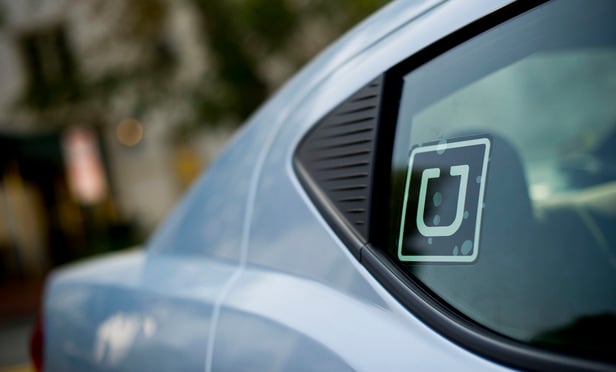 Photo: Diego M. Radzinschi/ALM
Photo: Diego M. Radzinschi/ALM
When Austin Lee stepped into a car he hailed through Uber, what he did not know was that the driver was not the one named in the app, a new lawsuit filed in Allegheny County against the rideshare giant alleges.
According to the complaint, Lee—who was using the ride-sharing service last year—thought he would be driven by Tina King, who was signed into the Uber app. But another woman, Linda Bruce, was driving. Lee did not know that fact until after Bruce lost control of the car she was driving, crashed into a tree and Lee got a copy of the police report describing the accident.
Lee has now sued King, Bruce and Uber over the accident, in which he sustained neck and rib fractures. The suit, Lee v. Uber Technologies, was filed March 29 by Pittsburgh attorney John P. Goodrich.
“I think Uber gives its customers a false sense of security,” Goodrich said. “If Uber doesn’t start doing a better job, you’re going to have to start carding Uber drivers like you would do for underage drinking.”
A spokeswoman for Uber said the company would decline to comment on pending litigation, and The Legal was unable to find contact information for either Bruce or King. According to the docket, Bruce, King and Uber have not yet retained counsel to defend the case.
The lawsuit lodges claims of negligent hiring and supervision and vicarious liability against Uber, as well as a claim of negligent entrustment against King and general negligence against Bruce, the driver.
According to the complaint, after requesting a ride on March 19, 2016, Lee was told that “Tina” would be picking him up in a Chrysler Sebring. Although he was picked up in a Chrysler Sebring with an Uber decal in the front window by a driver who knew his name and requested destination, the driver was Bruce, not King, the complaint said. According to the complaint, King had provided Bruce her Uber log-in credentials.
Bruce drove the car with Lee in the backseat, but she became distracted by her cellphone, lost control of the car and slammed into a tree along Bigelow Boulevard in Pittsburgh, the complaint said. Lee was taken by ambulance to UPMC Hospital. He was subsequently charged $18.61 for the ride, the complaint said.
Bruce later told police she thought a tire on the car had blown, the complaint noted.
The complaint also said that King had been found guilty on numerous traffic offenses, including speeding, driving an unregistered vehicle, failure to stop at a red light and careless driving. She also accepted ARD, or Accelerated Rehabilitative Disposition, on two criminal charges dating back to 1988, the complaint said. A review of state criminal dockets confirmed the charges and ARD.
Lee alleged that Uber failed to perform an adequate background check, and should have implemented safety measures to prevent a third party from accessing an Uber driver’s account. The company further failed to have measures in place to properly identify the actual driver “through voice, face, thumbprint, or any other biometric identification,” the complaint said.
“They have driverless cars and they want to be such a technology-forward company, but this is something that should be very basic,” Lauren Nichols, who filed the case with Goodrich, said. “I need my thumbprint to get into my phone, so why should a driver not have something similar.”
The complaint also states plainly that “Uber drivers are employees of Uber” and outlines the relationship between King and Uber in the portion making the vicarious liability claim, but Goodrich said he is expecting Uber will say that the driver was not a permissive driver.
“But that belies the point that, if it’s not a registered driver, then how can you charge him for the ride?” Goodrich said.
The accident occurred several months before a statewide law went into effect that created a regulatory framework for ride-hailing companies like Uber and its competitor, Lyft.
Uber and Lyft both entered Pennsylvania and began ferrying passengers prior to obtaining experimental licenses from the utility commission, which they were both granted in early 2015.
Max Mitchell can be contacted at 215-557-2354 or [email protected]. Follow him on Twitter @MMitchellTLI.




